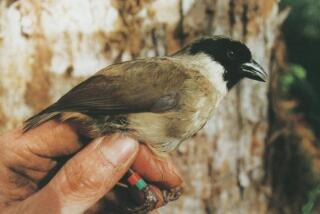U.S. wildlife officials say it’s time to take manatee off endangered species list
Reporting from Fort Lauderdale, Fla. — Manatees would lose their status as endangered species under a proposal announced Thursday by federal wildlife managers, who say the tubby marine mammals have made a robust recovery since first receiving protection in 1967.
The U.S. Fish and Wildlife Service plans to reclassify the manatee from endangered to threatened in response to a review initiated by a petition from the Pacific Legal Foundation, a free-market legal advocacy group that represents property owners on Florida’s Gulf Coast.
“It’s really a success story,” Jim Valade, Florida manatee recovery coordinator for the U.S. Fish and Wildlife Service, said Thursday. “They still need our attention without a doubt, but they are no longer in intensive care, per se.”
See more of our top stories on Facebook >>
The agency said the species, one of the first that U.S. authorities classified as endangered, has increased in numbers over the last few decades and appears robust enough to face a very low risk of going extinct.
“Current population estimates are 6,350 manatees in the southeastern continental United States and 532 manatees in Puerto Rico,” the wildlife service wrote in a notice to be officially published Friday. “These numbers reflect a very low percentage chance of this animal going extinct in the next 100 years.”
A species classified as threatened retains virtually the same protection against being killed, harmed or harassed as one classified as endangered. Government agencies must take them into account in approving construction or other activities that could affect them. No-wake zones and fines for boaters who ignore them will remain in place.
The agency said the reclassification would not affect conservation measures that it credits with the manatee’s rebound, such as the establishment of more than 50 protected areas and restrictions on the construction of docks.
But the reclassification would be a step toward removing the manatee altogether from the protected list, which would cost it much of its legal protection. “Threatened” means the species can become endangered in the foreseeable future. “Endangered” means it is at imminent risk of extinction.
Loved by many as a rotund and harmless visitor to shorelines and canal banks, the manatee has also inspired protection measures that have angered many residents and property owners.
Waterfront developers have been forced to limit construction of marinas and docks. Boaters endure long commutes to the ocean, as they obey slow speed zones designed to protect the manatees from collisions. Last year, 87 manatees were killed by Florida boats.
The decision is not final and is certain to be fought by environmental groups, such as the Save the Manatee Club.
The U.S. Fish and Wildlife Service plans a public hearing and will accept public comments before announcing a final decision. The 90-day comment period begins Friday.
Conservation groups denounced the decision, saying the same threats that landed manatees on the endangered species list persist today.
“The Florida manatee has come a long way, but is still threatened by boat strikes, cold stress and undiagnosed mass die-offs in the Indian River Lagoon,” said Jaclyn Lopez, Florida director at the Center for Biological Diversity.
Patrick Rose, executive director of the Save the Manatee Club in Maitland, Fla., agrees.
“There are some critical steps that need to be taken to secure the manatee’s future -- and those steps have not been taken,” Rose said.
He said 60% of the state’s manatees rely on artificially warm water generated by power plants to survive.
“There is no real plan or proposal to deal with that,” Rose said. “That’s a really big deal. We could lose half of the population -- over 1,000 manatees -- if we don’t deal with what’s going to happen to those power plants down the road.”
And while fines remain in place for boaters who speed, most are never caught.
Patience Cohen, a spokeswoman for the Marine Industries Assn. of South Florida, called the reclassification a “positive for everybody. It says what we are doing is working.”
She acknowledged manatees do get slashed by boat propellers.
“Unfortunately, accidents happen,” Cohen said, but educating boaters is part of the solution to keeping the waterways safe for manatees.
The petition by the Pacific Legal Foundation was filed on behalf of a group of Florida Gulf Coast residents who oppose further federal restrictions on boating and waterfront construction.
“The good news is that the manatee is increasing and federal officials are finally acknowledging this fact,” said Christina Martin, an attorney with the Pacific Legal Foundation’s Atlantic Center office in Palm Beach Gardens, Fla. “The bad news is that federal officials took so long to accept the good news about the manatee’s improvement.’’
ALSO
SeaWorld settles orca trainer safety citations
Elephant seal that tried to cross California highway is now a mom
Dance of the dinosaurs? Strange gouges hint at bird-like mating rituals
More to Read
Sign up for Essential California
The most important California stories and recommendations in your inbox every morning.
You may occasionally receive promotional content from the Los Angeles Times.












